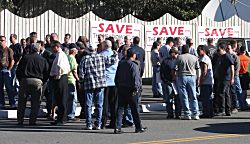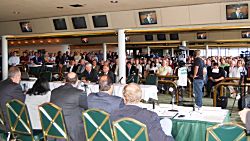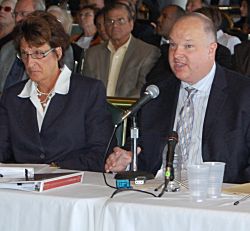New Jersey legislative summit continues at Meadowlands
September 10, 2010,by Ellen Harvey, Harness Racing Communications
Editor’s Note: Complete video coverage from the summit is available at the USTA’s YouTube page.
East Rutherford, NJ — Testimony continued on Friday morning (Sept. 10) at the Meadowlands in a New Jersey legislative summit designed to explore problems and possible solutions to declines in business in both Atlantic City and the Meadowlands.

Lisa photo
A crowd gathers outside the Meadowlands before the second session of the New Jersey legislative summit on Friday.
The testimony was largely centered around horse racing and the future of the Meadowlands. The morning’s primary testimony came from Dennis Robinson, Chief Executive Officer of the New Jersey Sports and Exposition Authority. Much of Robinson’s testimony centered around the results of a re-engineered meet at the Authority’s Thoroughbred track, Monmouth Park, this past summer and the possibility that model could work for harness racing.
“We brought all the parties to the table, everyone set aside their differences,” said Robinson, for a meet that was shorter than had been typical in the past, but produced higher purses and a more attractive betting product. The results, Robinson said, included, “a 213 percent increase in average daily wagering, average daily on track handle is up 79 percent. Our average attendance went up 47 percent. We had 41,000 for the Haskell.”
In harness racing, Robinson said, “we hope to do more of the same.”
Robinson also spoke of the Authority’s efforts to deal with the challenges of the economy and the subsequent downturn in business at the Authority’s properties.
“We tried to adapt annually and even day to day,” he said.
Staff reductions of 44.5 percent since 2002 and 18 percent since 2008 have been implemented.

USTA/Ken Weingartner photo
The summit is designed to explore problems and possible solutions to declines in business in both Atlantic City and the Meadowlands.
Robinson also spoke of the success of the Authority’s off track wagering facility in Woodbridge, which handled $90 million in 2009. Robinson was asked by members of the legislative panel, including Senator Jim Whelan, why more off track wagering facilities have not been up and running.
“In the last two and a half years, we identified four sites, one of those sites (Bayonne) was approved,” said Robinson. “The other three were not approved by local authorities.”
Robinson explained that the existing sites have been profitable for local communities and the Authority has been proactive in providing their own security as well as some for their neighbors.
The legislative leaders exoressed reluctance to enact laws to override local approval policies and urged Robinson to aggressively seek alternate sites and get them up and running.
“You said you identified four sites,” said Senator Van Drew. “Why not 40?”
Robinson cited the extensive research necessary to ensure that an investment of perhaps $10 million to build such a facility was justified and could be profitable.
Robinson declined to express an opinion regarding whether the Authority would like to have slots or other casino games at the track.
“We have an agreement with the casino industry not to legislatively seek slots and I’m going to honor that agreement,” said Robinson. “But I will ask you to think about this — diversification versus subsidization. Atlantic City sells bets. We sell bets. It is very hard to succeed when you can only sell one kind of bet.”
Senator Paul Sarlo, who represents Bergen County, where the Meadowlands is located, asked Robinson to delineate the source of the debt that the Authority carries.
“There is $735 million in debt, about $315 million of that is related to the Atlantic City Convention Center and another $35 million for the Wildwood (near Atlantic City) Convention Center,” said Robinson.
Robinson summarized that less than half the debt carried by the Authority is directly related to operations in East Rutherford, while conceding that much of that debt was serviced by funds generated in Atlantic City.
Senator Sweeney urged Mr. Robinson to aggressively meet with stakeholders related to the harness racing industry to explore the viability of a concentrated, high purse meet for harness racing similar to what was implemented at Monmouth Park this summer.
A panel of six representatives from the unions that work at the Authority’s properties were nearly unanimous in urging the panel to consider “out of the box” strategies to keep the track and the Meadowlands, in the words of Kevin O’Brien of the Stagehands Union. Those solutions ranged from a full blown casino to sports betting.
“Can you imagine this room with sports betting?” said O’Brien.
Assemblyman Ralph Caputo, from nearby Essex County, echoed the sentiments of many of the union officials that spoke and called for expanded gaming at the Meadowlands.
“Let’s put together a consortium so they (Atlantic City) can share in these profits,” said Caputo. “Out of everything that’s been said, that is the basic thread laid down in terms of our work here with both industries. If we don’t make right choice, we could have harness racing out of business and the casinos out of business. That’s how important the compromises are that have to be made.”
The panel that represented horse racing interests was led by NJ Standardbred Breeders and Owners Association President Tom Luchento. The full text of his remarks are contained here.
“I’d like to tackle a misconception that has been perpetrated,” noted Luchento. “The casino industry has not been supplementing racing. The casino industry has been, to put it in our parlance, horse trading for the past several years. They paid us to make up the difference of what we were losing by not installing slot machines at the tracks. It bought them time during which they should have been preparing to reinvent themselves as a gaming destination.
“I might also add that while our last agreement was for three years, the state awarded the casinos a lifetime tax abatement on what they give away in perks. So do not be fooled by their generosity to racing. They were richly rewarded and continue to be the beneficiaries of this arrangement.
“Without dissecting the Hanson Report here, it offered four suggestions for the future of racing. Three are recipes for failure and the fourth is something that we are seriously exploring — privatization. We have interested buyers but progress in that area is based on our ability to structure a long-term lease or purchase which currently is not on the table.
“To move on to the next step, we need to work with the legislature to create a plan to provide a bridge to a more permanent solution that permits a long-term lease or purchase agreement. We propose to follow the model of Monmouth Park’s elite meet and trim the Meadowlands racing schedule to 100 dates with purse money that will lead our industry.
“We propose that the Meadowlands evolve into a gaming facility with racing among the many offerings. This is not only about making horse racing solvent — it is about a dramatic flow of funds for the state treasury, upward of a billion dollars a year.
“So while this plays out in the media as a dispute between legislators, as a battle between north and south, as a conflict between casinos and racetracks — the loser is the state of New Jersey.”
John Forbes, of the New Jersey Thoroughbred Horsemen’s Association, echoed Luchento’s remarks.
“We certainly share the same ideas. We depend on purse dollars to present the world class racing necessary to succeed and to sustain our industry and help it grow. We cannot compete in the racing world in New Jersey with neighboring states that have alternative gambling; we just can’t fund the racing we need. We won’t have the tools necessary. We have to sell bets the same as the casinos.”
In speaking of the compacted Monmouth meet this summer, Forbes said, “We never intended it to be a model of what reduced racing could do. We needed it to show what increased purses could do.
“We may be a suspicious bunch, but we sort of suspect that having racing out of the way would be convenient. You wouldn’t have “racinos,” you’d have casinos here.
“It would be convenient not to have to give the racing industry any money if you brought slots to the Meadowlands. Some have suggested it (bringing slots to the Meadowlands) could be delayed and it could be convenient if some of the casinos on the brink, that were on the brink, were to die off,” said Forbes.

USTA/Ken Weingartner photo
USTA Executive Vice President/CEO Mike Tanner speaks while Dr. Karyn Malinowski, director of the Rutgers University Equine Science Center, listens.
Mike Tanner, Executive Vice President/CEO of the United States Trotting Association, spoke about the place of the Meadowlands in the racing world.
“Everyone in our sport is paying such close attention to what happens at the Meadowlands because the Meadowlands is the gold standard,” he said. “It’s the standard against which eveyone else is measured, not just betting handle, but quality and allure. It is the best and brightest of the industry and has been since the facility opened.
“Despite the fact that average daily overnight purses offered at the Meadowlands no longer top the industry, having been passed by several tracks whose state governments allow them to have gaming, the track continues to be our leading venue. Consider this — there were about 1,700 races contested at the Meadowlands last year. It’s about 3 percent of all the harness races held in the United States, but 25 percent of all money bet in the United States was bet on Meadowlands harness racing. It outperforms itself in terms of the number of races. I think it’s interesting that it allows New Jersey to present a few world class events per year and to present world class harness racing day in and day out.
“In the Hambletonian recently contested, $2.39 million was bet on the Hambletonian from France and Sweden. It was about 28 percent of the entire day’s handle and that far outpaced betting in those countries on another race you may have heard of — The Kentucky Derby. That is how important this is. The people wearing the white and green T-shirts in this room (distributed by the Standardbred Breeders and Owners Association), they’re the ones that made this happen.
“I would be remiss if I failed to mention Freehold Raceway and its importance to the industry as well. They provide a continuum of competition for horses and horsemen here in New Jersey and it contributes to the state tax rolls. The job that it provides, similarly, should not be ignored.
“When you think of Meadowlands harness racing nationally, it’s like thinking of what Wrigley or Fenway or Yankee Stadium is to baseball or what Daytona is to NASCAR and should be considered as such.
“I’m originally from New Jersey, I care about this personally, but from a national perspective as well, I can tell you that the harness racing industry, in the United States, would be irrevocably damaged if the Meadowands were marginalized or even worse, eliminated.”
Dr. Karyn Malinowski, director of Rutgers University Equine Science Center and a Standardbred owner and amateur driver, spoke of the specifics about what horse racing means to the state. She reviewed statistics that show that only eight percent of the state’s preserved farmland, which pays lower taxes, hosts horses.
The state has less than a million undeveloped acres, of which 56,000 are directly related to horse racing related purposes.
“The state of New Jersey deserves a strong horse industry,” noted Malinowski. “The issue is not one driven by emotion. Horse racing remains the driving economic engine for the equine industry in this state. It is about the future of agriculture in the Garden State and an industry that influences the quality of life for us all.”
Senator Jim Whelen noted that racing’s hue and cry for slots would have to overcome a governor (Chris Christie) who has said no to slots outside Atlantic City, and a Senate president that has also said no.
“Given that,” Whelan asked, “What are the alternatives? Maybe some of it involves contraction, maybe it involves off track wagering and internet wagering and if we’re just going to argue about slots at the Meaowlands, how is that productive? What other options are there for a sustainable industry?”
Tom Luchento was first to answer.
“We are looking in to every aspect that may or may not help, we think the idea we have will help,” said Luchento. “If we cannot change and develop as they (casinos) are allowed to do, they are allowed to change and morph into what they need to be. I understand and respect their opinion, but that is their opinion. Atlantic City has been given the tool box to do everything they can to help themselves. We want one thing. We want to put money back into New Jersey. The governor and the legislators work for the people of New Jersey and we need to do the best for the people of New Jersey.”
Assemblywoman Sheila Oliver, speaker of the Assembly, assured the panel that all options would be considered.
“We will allow a free and open discussion,” she said, “and bring the best minds and best expertise at committing to and making certain that this does not end up in some regional decision.”
Chris McErlean spoke on behalf of Freehold Raceway.
“We’re the oldest harness track in the United States,” he noted. “We’re probably one of the most important, since 65 percent of our purse money goes to owners in the state of New Jersey. There is a multiplier effect in direct economic impact. My company is a casino racetrack. The company has 19 casinos and 12 racetracks, four of those have casino gaming. Hundreds of millions were generated for the jurisdictions where those properties exist.
“There are positive things that can be done in the state of New Jersey. Reduced racing dates, sports betting, those are all concepts, we support implementation of all of them, but they’re incremental. Those are not going to have a huge, huge impact in terms of the horse racing industry. We want to be part of the discussion. If plans are being developed (for racing in New Jersey), we want to be part of those. We have been a positive influence, we want to be positive in the future and participate equitably and fairly.”
The third and final hearing will be held at Monmouth Park in central New Jersey. A date has not yet been set, but is expected to take place before the end of the month. From the ideas and information garnered at the meetings will come legislative action designed to strengthen both racing and casino industries.
- New Jersey Dems present their plan to aid racing (Tuesday, October 19, 2010)
New Jersey Democrats have reportedly formulated a plan to aid the state’s racing industry: The plan calls for shortening race meets at The Meadowlands and Monmouth Park, opening more off-track wagering parlors, and permitting tracks to offer in-state Internet wagering — if approved by voters.
- Codey continues to fight for Meadowlands casino (Tuesday, November 09, 2010)
A New Jersey lawmaker, State Sen. Richard Codey (D-Essex), told a State Senate committee working to hasten the opening of as many as a dozen off-track betting parlors in the state that slot machines are needed at New Jersey’s racetracks.
